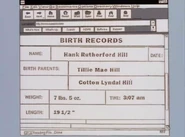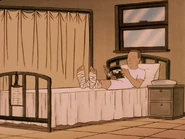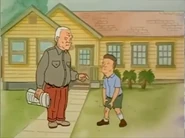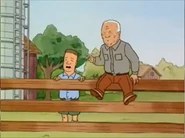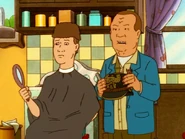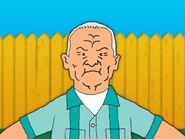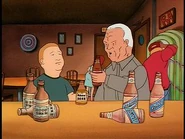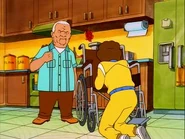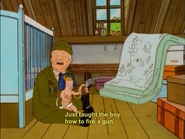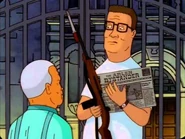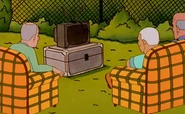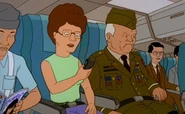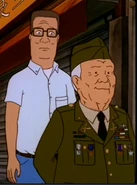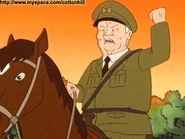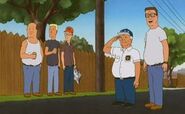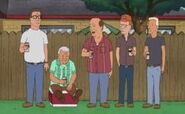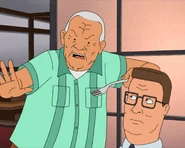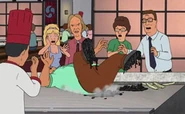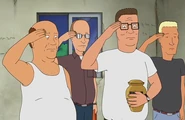Colonel Cotton Lyndal Hill[1] (age 75[2]) was the father of Junichiro, Hank Hill, and Good "G.H." Hank Hill, the father-in-law of Peggy Hill and the grandfather of Bobby Hill.
Cotton was also a WWII veteran who had his shins "blowed off by a Japanman's machine gun" in combat, and later had his feet attached to his knees. He claims he faked his age when he was 14 so he could get enlist in the military when WWII broke out. That made Cotton a foot shorter than his fellow family members and caused a characteristic waddle (according to Hank, Cotton was 6'2" with his shins, and 5'0" without). Despite his disability, Cotton eventually reached the rank of Colonel in the Texas State Militia and was often addressed by that rank.
Military Service[]
Cotton was extremely proud of his military service record and his status as a war hero, although he tended to exaggerate his exploits. Cotton claimed that he killed "fifty (50) men" during the war. He also consistently reminded everyone within earshot about how he lost his shins during WW II.
"I was 14, but I knew Uncle Sam needed me, so I lied and signed up. We had beat the Nazzys in Italy, and they shipped us to the Pacific theater. A Tojo torpedo sent our troop ship to the bottom. I could only save three of my buddies: Fatty, Stinky and Brooklyn. They were kind of like you fellas [Bill, Dale, and Boomhauer], only one of them was from Brooklyn. Out of the sun came a Tojo Zero and put fitty bullets in my back. The blood attracted sharks. I had to give 'em Fatty. Then things took a turn for the worse. I made it to an island, but it was full of Tojos! They were spitting on the U.S. flag! So I rushed 'em, but it was a trap. They opened fire and blew my shins off. Last thing I remember, I beat 'em all to death with a big piece of Fatty. I woke up in a field hospital, and they were sewing my feet to my knees."
Cotton referred to the Japanese as "Tojos", a slur not unlike "Jap" and doubtless derived from war-time Japanese Prime Minister and General Hideki Tojo. He also referred to the Nazis as "Nazzys".
Despite claiming to have been shipped from Italy to the Pacific Theater, Cotton also claimed to have fought in both Munich and Okinawa within days of each other. Though he had legitimately believed he had fought in Munich, Peg informed him he did not during his cemetery plot burial hearing, which made him realize he did not. According to military records which Peg distributed, it has only been confirmed through documentation that he fought in Italy's Sardinia campaign and the Pacific Theater battles of Guam, Solomon Islands, and Okinawa. He was therefore likely just stationed in Italy and the Pacific during the war.
Based upon Cotton's uniform in "Returning Japanese", he earned the following military decorations: Medal of Honor, Purple Heart, Silver Star, and American Campaign Medal. In "When Cotton Comes Marching Home", his Silver Star was displayed in a case at the VFW.
Cotton stated in a sixth season episode, that he served with the U.S. Army's 77th Infantry Division. In "Returning Japanese," it was confirmed that he was transferred home from Japan when his military service concluded.
Cotton also told many stories about his service, although many of them may have been untrue or could have been greatly exaggerated.
Solomon Islands[]
In "Cotton's Plot", Cotton told Peggy a story about his service on the Solomon Islands, where his unit was pinned down by Japanese machine gun fire. Then he snuck into a Japanese fifty-five gallon drum of sake, and then, when the Japanese were drunk, he spit it all out into his lighter, and "hibachi'd" the whole squad.
Guadalcanal[]
In the episode "Yankee Hankee", Cotton said he served on Guadalcanal with his buddy Stinky and it rained for 17 days.
Anzio[]
On January 30, 1944, Cotton said that he and his unit invaded Anzio, and they caught the Krauts "with their pants down and their schnitzel exposed". He said they captured the beach by noon and the town by nightfall.
Normandy[]
Cotton said he climbed the cliffs of Normandy with a fifty-pound ice cream maker on his back in "Cotton's Plot". This story was likely untrue, as Normandy is located in northern France and the Italian campaign which Cotton was confirmed to have partaken in was still ongoing during the time the historic D-Day invasion of Normandy occurred.
Saipan[]
In "When Cotton Comes Marching Home", Cotton claimed to have led a platoon of men through the jungles of Saipan.
Guam[]
Cotton claimed to have been in Guam in 1944, and crawled through a minefield in order to retrieve General MacArthur's corn cob pipe. That story was told in "Cotton's Plot".
Philippines[]
Cotton said that he served on the Philippines in "Unfortunate Son".
Iwo Jima[]
In "Revenge of the Lutefisk", Cotton claimed to have spent two weeks under a pile of bodies on Iwo Jima. Also, in "Unfortunate Son", Cotton and Topsy demonstrated a bayonet technique that Topsy used to gut a banzai charger on Iwo Jima. What was worth noting was that the United States Marine Corps, not the Army, fought against Japanese forces during the Battle of Iwo Jima.
Munich[]
In "Cotton's Plot", Cotton claimed to have fought in Munich on April 30, 1945, but later realized that he did not.
Okinawa[]
Cotton said that he served in Okinawa in "Cotton's Plot", and on May 2, 1945, he invented a bayonet technique that the Army still uses.
P.O.W. Camp[]
Cotton was captured at an unknown time by the Japanese, and put in a bamboo rat cage. Cotton had to eat rats, but let the last one live so he could eat its droppings. He called it "Jungle Rice", and said it "tasted fine". By September, he was skinny enough to slip through the bars, and strangled the guard with a string made of braided rat tails, and ran to safety ("Cotton's Plot"). Cotton also learned to stop his heartbeat, so the Japanese would stop torturing him for a moment, probably at the P.O.W. camp ("Death Picks Cotton"), and claimed that he only cried when the Japanese tore off his fingernails ("Returning Japanese").
Miscellaneous[]
Cotton severed the windpipe of a German corporal with a two foot strand of dental floss that he kept in his boot ("The Final Shinsult"). He survived on a life raft by trapping rain water in his upturned eye lid ("Cotton's Plot"). Cotton killed a high ranking German officer and took his helmet as a souvenir which he later used to cut Hank's hair and claimed that Hank cried more when he cut his ear than the officer when he killed him ("Hank's Bad Hair Day"). This is most certainly false as the helmet is a Prussian style pickelhaube, which was phased entirely out of use at the end of World War I and not issued during World War II.
Awards and Decorations[]
In the episode, "Returning Japanese", Cotton was shown in full military dress and was shown wearing the American Campaign Medal, Purple Heart, Silver Star, and the Medal of Honor. The Medal of Honor is the American military's highest honor.
Post-War[]
Not much was known about Cotton after WWII until the present. Before being honorably discharged and shipped home to Arlen, Cotton briefly stayed in Japan for a year during the American occupation, but mainly in a U.S. hospital in Tokyo where he underwent a procedure to re-attach his feet to his knees. It was here where he had his first romantic relationship with a Japanese nurse named Michiko, who he unknowingly impregnated before being shipped back home. In "When Cotton Comes Marching Home", he claimed that he previously "supervised the installation of asbestos in every public school in Heimlich County, and eleven bowling alleys." His son, Hank, was born sometime in 1959 at a baseball game in Yankee Stadium in New York City; in real life, Castro staying "in Washington" as Cotton claimed in shortly after seizing Cuba. Cotton had planned to assassinate Fidel Castro with a poison dart, who attended the game, by using his pregnant wife as a way to get past security. The shot missed, the assassination attempt failed and Tilly had to give birth in the stadium's ladies' bathroom. Both Cotton and Tilly kept Hank's birth location a carefully guarded secret, until Hank found out when he tried to find his birth certificate to get a "Born in Texas" license plate, which neither Cotton nor Tilly claimed to have (Yankee Hankie). Cotton was a longtime member of the Arlen VFW and served as its commanding officer.
Cotton briefly used the alias "General Mills" when he failed his driver's test and carried a fake driver's license manufactured from a Cheerios box by Dale Gribble. Cotton and Tilly had a bitter marriage and eventually divorced. He later remarried and moved to Houston. Despite his visits, Cotton wouldn't take up residency in Arlen again until after was evicted from his Houston residence. Though he was a able to own an expensive Cadillac from Lang Pratley's automobile dealership, it noted in the same episode that Cotton wasn't in a good financial state by the time he moved backed to back to Arlen in "When Cotton Comes Marching Home," with even his Cadillac being repossessed by Pratley. Pension benefits also couldn't prevent Cotton from being forced to take up odd jobs to provide for his second wife and his infant son.
Relationships[]
- Didi Hill: Cotton's second wife and mother to his youngest son. Didi was working as a candy striper at a local hospital when he met her for the first time and Cotton appeared to fall for her for the sole reason that she appeared to have a large butt. Like with most other women he encounters, Cotton is incredibly sexist and demanding of Didi; believing that she should not work, she should do all the housework and care for their infant son, accept Cotton's behavior without question, and many other things.
- Hank Hill: Cotton's relationship with Hank appears to have been strained since Hank was very young. Cotton appears to have rarely held his tongue when speaking down to Hank toward anything Cotton thought he was 'failing' at and would usually refer to Hank as a sissy or a quitter if he ever failed to meet Cotton's expectations. Even with Hank as an adult, Cotton often torments Hank by going to his house unannounced, annoying the family, and generally doing whatever he wishes without concern towards the situation of others. Despite this, Cotton is well aware that Hank is the person he can turn to for help when he needs it most and never hesitates to call Hank "My Boy". While he is usually harsh toward Hank, Cotton has proved that he does care about him and will help Hank when he needs it, mostly in secret. At one point, Cotton became depressed and enraged by the fact that he and Hank did not have a good relationship and by the fact that Hank was willing to tell his boss Buck Strickland, though in improper fashion, that he loved him. In same episode, he went homicidally insane when Hank said that he hated him and would not consider reconciliation until intervention by former U.S. President Jimmy Carter convinced them not to hate each other for the time being.
- Bobby Hill: Interestingly enough, Cotton appeared to have a good relationship with his grandson Bobby, likely due to his outgoing nature as opposed to Hank's uptight reserved attitude. It could be assumed that Cotton was attempting to make up for his own strained relationship with Hank through his close relationship with his grandson, although he legitimately thought the world of Bobby. He once conceded that Hank was a better father than himself and stated to Hank "You made Bobby. I only made you." Cotton often showed that he was proud of Bobby and supported him. Cotton often tried to pass on his misogynistic views to Bobby and even went as far as trying to buy him a hooker once, although Hank and Peggy were always able to reverse the damage. Cotton demonstrated his affection for Bobby in numerous instances. In "How to Fire a Rifle Without Really Trying", he came to watch Bobby and Hank shoot in a father-son shooting competition and stated: "I'm always here to support my Bobby.". In "Revenge of the Lutefisk", Cotton even went as far as to take the blame for Bobby after Bobby confessed that he was the one who burned down the church by accident. Didi revealed to Bobby that Cotton told her that if their unborn child turned out as good as Bobby, he wouldn't abandon it. In "Death Picks Cotton" Hank stated that, "My dad doesn't love a lot of things, but he does love Bobby." In "An Officer and a Gentle Boy," Cotton also had more faith in the possibility of Bobby being a war hero like him.
- Peggy Hill: For reasons that are not completely clear, Cotton's relationship with Peggy is openly hostile as he appears to have a great disliking of Peggy. Cotton usually addresses Peggy as "Hank's Wife" and appears to take great joy in annoying Peggy in anything she takes pride in. Cotton seems to be aware that Peggy does not like him and uses this to further aggravate her. However, he does occasionally help Peggy when she appears at her lowest, such as when she was fired from teaching for spanking a student and helping her learn to walk again after her sky diving accident.
Cotton may or may not had a high sperm count. Cotton fathered three (known of) boys, first being Junichiro from a love affair in Japan during WWII with a Japanese nurse named Michiko. The second, Hank, from his first marriage to Tilly. Then, the third, Good Hank, with Didi, when he was well into his seventies, which was uncommon and was also (as told by Cotton) conceived through two condoms. It's also odd that while Cotton had a great talent in fathering children, his first two children had trouble conceiving as they had narrow urethras, so the chances of his third having it was high.
Death[]
In "Death Picks Cotton," Cotton was badly injured at a Japanese Steakhouse. When Cotton climbed onto a grill table, he slipped and suffered burns, a hip fracture, and torn ligaments in his knees/ankles. Cotton was also diagnosed with an infection of the esophagus after he ingested a piece of shrimp (which he was highly allergic to). It was also discovered that Cotton had four, rusty bullets in his back (one of which was in his heart). While at the hospital, Cotton also suffered a heart attack, but somehow survived. Cotton stayed alive long enough to torment Hank and Peggy by slowing his heart rate and mimicked his death (a trick that he learned in a Japanese POW camp in order to escape torture).
While Peggy visited with Cotton, she stated that she hoped that he could live forever in the friendless, spiteful existence that he created for himself. Cotton replied, rather deviously: "Do you now?" before he let out a maniacal laugh and died immediately after. Hank then came into the room soon after and Peggy didn't tell him of the final exchange that she and Cotton had, where he strongly criticized Hank by telling Peggy "You're worthless. You're not even good enough to marry my worthless nothing of a loser son" but instead lied and told Hank that Cotton spoke kindly of him.
The final scene of the episode showed Hank, Bill, Boomhauer and Dale gathered in Hank's backyard, in front of a newly finished shed. Hank places a plaque which reads "Cotton Hill: American" on the shack to commemorate and remember his father. As Boomhauer and Bill praise the shed and the plaque the shed promptly explodes. The group is stunned until Dale reveals that he blew up the shack according to Cotton's wish to destroy Hank's "sissy shack". Dale then begins celebrating the shack's destruction, dedicating its destruction to Cotton. A separate deathbed request by Cotton to have his head detached from his body and mailed to the Emperor of Japan was not honored; Hank planned to honor that request until Peggy lied to him and said that Cotton had rescinded it right before his death. Neither Didi nor G.H. appeared in the episode, nor was Cotton's painting shown.
Fox published the following obituary for Cotton:[citation needed]
- Arlen Bystander (Arlen, TX): Cotton Hill, age unknown, World War II veteran, died Sunday in a Texas VA hospital. Hill suffered from several injuries ranging from four rusty bullets lodged in his heart from his military service, a broken hip and torn ligaments in his ankle-knees, to an infection in his esophagus and severe burns caused by a freak shrimp accident that occurred earlier this week at Tokyaki's Japanese restaurant. Hill leaves behind sons Hank Hill and G.H. (short for "Good Hank"); daughter-in-law Peggy Hill; grandson Bobby Hill; ex-wife Tilly; second wife Didi; first love and former Japanese lover Michiko; an illegitimate Japanese son, Junichiro; and nephew Dusty Hill (of band ZZ Top).
Posthumous[]
In "Serves Me Right for Giving General George S. Patton the Bathroom Key," Hank received a box of Cotton's old possessions from Didi, who revealed that she was engaged to a wealthy professional wrestler. Hank read through the list of insane tasks, the last of which was flushing Cotton's ashes down a toilet which George S. Patton once used (which contradicted an earlier episode where Cotton, with Peggy's help, successfully fought to be buried in the Texas State Cemetery). Hank followed through with the deed.
Personality[]
Cotton was consistently a chauvinistic, violent, abusive and intolerant character. Cotton talked down to women, berated his son, was prone to violent outbursts, and, on more than one occasion, exhibited homicidal tendencies. Cotton's abrasive and misogynistic manner was consistently embarrassing for Hank and usually infuriated Peggy. Throughout his history in the series, Cotton never once addressed Peggy by name, but instead called her "Hank's Wife", which was used as a running gag, including on the very rare occasion that he's tried to be nice to her ("Cotton's Plot"). Cotton even passed on some of his sexist and misogynistic traits to Bobby, and, at one point, taught him that women should be made to cook and clean for their husbands all day long. Both of his wives endured his verbal and psychological abuse, though Didi would somehow stay with him until his death. He also once briefly threw out Didi from his home after he chose to get job rather than remain a housewife. ("The Final Shinsult") Though presented as conservative, including on issues such as guns, he does at times show support for his former Commander-in-Chief Franklin Delano Roosevelt.
On rare occasions, Cotton showed a vulnerable side that he normally kept hidden: Cotton realized that he was a terrible father, hated himself for growing old and becoming disabled, and readily admitted that he would die in order to protect Bobby, after he was accused of burning down the Arlen First Methodist Church. ("Revenge of the Lutefisk") Cotton also expressed regret of drifting apart from Michiko, and told Bobby to not make the same mistake. Other moments of compassion is when he got Peggy reinstated, and kicked out Luanne's roommates. Despite being misogynist, he does not seem to support physical abuse. He blamed Hank for Peggy's skydiving injuries, saying: "I did not teach [Hank] to do that!".
Cotton also demonstrated a rough, demanding and often abusive, but at times inspirational leadership. Cotton admitted to Hank that he always wanted to win in battle, but accepted defeat when his men did their best. Through tough love and intense, physical therapy, Cotton also helped Peggy walk again after the debilitating skydiving accident. Hank was initially wary of that, because he feared that Cotton simply took advantage of Peggy's brief disability in order to humiliate her.
Cotton was very patriotic and considered himself superior to others for his sacrifice in World War II. He viewed German and Japanese people with hostility and even threatened someone with a bayonetted rifle for owning a Japanese car. When Cotton was selling a Nazi canoe, he was upset that the buyer was going to remove the Swastika, but only because he had a lot of pride in stealing the boat and wanted to keep its authenticity. Cotton also seemed to have a healed relationship with the Japanese: he received an award from the Emperor of Japan himself and told him: "...I took fifty of your boys. You took my shins. But we can move past that now." However, Cotton still seemed to have violent flashbacks to his times fighting in WWII. Other times Cotton experienced guilt and panic and then says: "Is this some kind of punishment for the fifty men that I killed?!". Among Cotton's first words to his son G.H. after his birth were "You wanna kill a Nazi? A Nazi-Squazzi?"
It was never revealed throughout the series how Cotton became such a nasty and rude character, or if he ever was a different person. It was most likely Cotton's childhood (the only things known about Cotton's childhood were: he started out with a gun at an early age according to Hank in the episode "How to Fire A Rifle Without Really Trying", that he attended Fort Birk when he was very young and spent much of his childhood there as he revealed in "An Officer and A Gentle Boy", that he apparently joined the Army when he was only 14 years old, and that Cotton's mother apparently died giving birth to him, as Cotton exaggerated in "Death Picks Cotton"). Almost nothing was known about Cotton's father, except that he may have been German, as Peggy told Bobby in the episode "Tears of an Inflatable Clown" as well as hinted at the end of Season 4 Episode 16, and it was possible that Cotton's father may have also been a war hero who may have served in the First World War and was the one who inspired Cotton to become one himself.
The only time Cotton ever himself referred to his father during the entire series was when he shouted at Hank: "You aren't my daddy, I'm your daddy!" Cotton also had an unnamed brother (Dusty's dad). Cotton was shown on multiple episodes that he suffered from mild to severe PTSD ("Returning Japanese" & "Death Picks Cotton") which could have explained for the majority of his "violent outbursts." Even the experience he had in life after having to live with no shins and his feet attached to his knees may been a factor. Whatever the reason was, Cotton never sought recognition for how he treated Hank, Peggy, Tilly, and many others throughout the series. In the episode "Hank gets Dusted" Hank said straight up to his cousin, Dusty, that Cotton was, in fact, a jackass.
Trivia[]
- Cotton was seen to have a good eye as he was able to tell that Kahn was Laotian at first sight, where it was a running gag early in the show that everyone believed that Kahn was Chinese, Japanese, or Korean.
- Cotton's knee/ankle setup, wherein his feet were surgically reattached directly to his knees repurposing them into ankles, required frequent medical attention for the rest of his life. Even in his old age, he regularly had to have his knees "drained" by medical staff.
- Some episodes seemed to have implied that Cotton had a form of post-traumatic stress disorder or a condition of the like. For example, in "Next of Shin," his fear and insecurity of becoming a father again combined with visions of seeing babies as Nazis and Japanese soldiers. In "Death Picks Cotton," Cotton got another flashback, that time only mentally heard as aerial bombs, while watching the Spanish-speaking chef prepare a dish with salt and pepper mills (that Cotton claimed were "Tojo wampum sticks").
- Cotton had Peggy secure him a grave spot in the Texas State Cemetery. However, several seasons later, his will instructed Hank to flush his cremated ashes down a toilet once used by George S. Patton as a tradition among his war buddies, which caused a bit of a continuity snarl. Although that could have been Cotton messing with Peggy.
- If Cotton had a nephew (Dusty), it was stated by Cotton in "Hank Gets Dusted" that ZZ-Top member Dusty was "his brother's son". That would have made Cotton, Dusty's father's fictional brother.
- Cotton seemed to be stronger than Hank as in "Nine Pretty Darn Angry Men," he pushed the door aside when Hank tried to close it.
- In the second episode of "Returning Japanese," Cotton claimed to have slept with 273 women. Given his penchant for prostitutes, that could have be true. That would mean that Hank and Junichiro probably had more half siblings (possibly in different races) considering that Cotton did not have a narrow urethra that stopped him from reproducing.
- Although never actually referenced or revealed, Cotton's "Cadillac car" appeared to be a 1969 Cadillac Coupe De-Ville.
- It was possible that Cotton's dislike for Hank was directly due to his dislike for Tilly. That could be seen through his love for G.H. and his pride in Junichiro despite having never met him before.
- In one episode, Cotton said that he went down to the Arlen Wax Figure Museum and gave the wax statue of former president Franklin Delano Roosevelt the middle finger.
Episode Appearances[]
- Season 1
- "Pilot" (flashback)
- "Square Peg" (flashback)
- "The Order of the Straight Arrow" (flashback)
- "Hank's Unmentionable Problem" (dream)
- "Shins of the Father" (in-person debut)
- Season 2
- Season 3
- Season 4
- "Peggy Hill: The Decline and Fall"
- "Cotton's Plot"
- "Movin' On Up"
- "Hank's Bad Hair Day" (flashback)
- Season 5
- Season 6
- Season 7
- "The Texas Skilsaw Massacre"
- "Full Metal Dust Jacket"
- "Queasy Rider" (non-speaking)
- "An Officer and a Gentle Boy"
- Season 8
- "DaleTech"
- Season 9
- Season 10
- "Harlottown" (pictured)
- Season 11
- Season 12
- "Death Picks Cotton" (final appearance)
- Season 13
- "Bwah My Nose" (flashback)
- "Serves Me Right for Giving General George S. Patton the Bathroom Key" (flashback)
